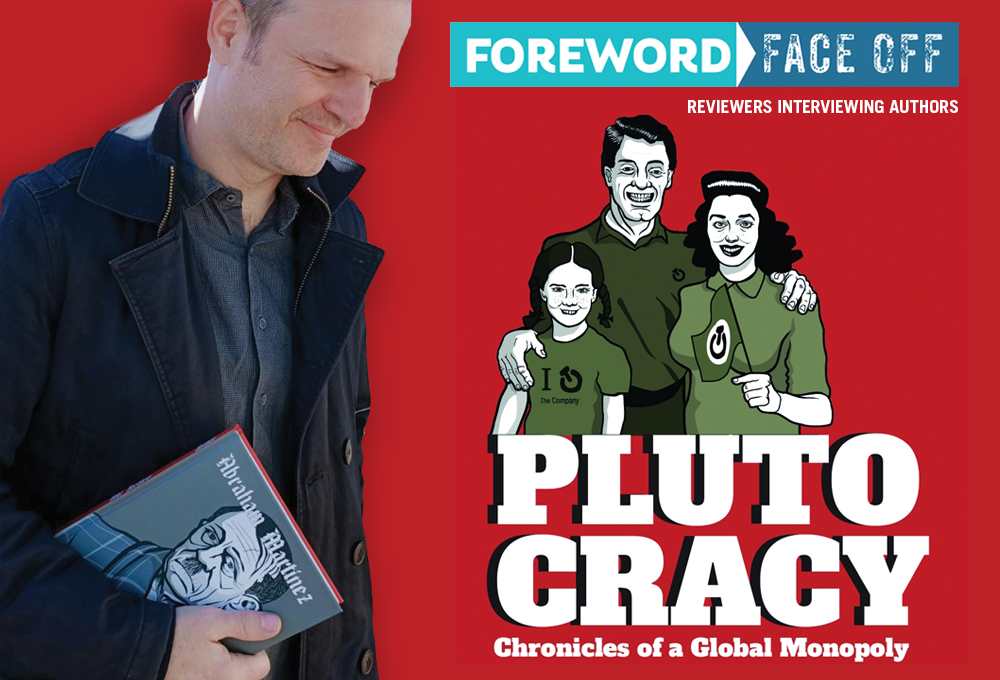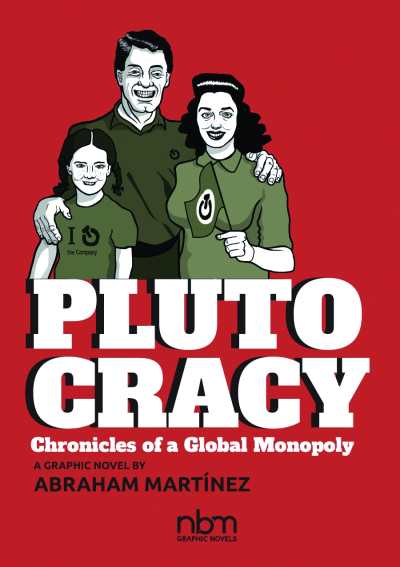Reviewer Peter Dabbene Interviews Abraham Martinez, Author of Plutocracy

One of the great pleasures of working so closely with the independent publishing community is the opportunity to see so many translations and book projects written by foreign authors. Independent publishers like Open Letter, Two Lines Press, Archipelago, Europa Editions, and World Editions pride themselves on finding important books originally published in Europe, Asia, South America, and other regions of the world and we look closely at everything they release. As we monitor book sales and bestseller lists to better understand this nation’s readers—especially in light of our travails with immigration policy—we can’t help but believe the US needs more exposure to foreign cultures. To this end, as a review journal, Foreword Reviews is committed to covering numerous translations in every issue. Our November/December issue was no exception.

Case in point is Plutocracy, a graphic novel written by Spanish author-illustrator Abraham Martinez, and published in the US by NBM. Described by Peter Dabbene as “a firm, memorable warning about the dangers of unfettered capitalism,” in his review for Foreword, we were intrigued by Abraham’s background and asked Peter to pitch him a few questions about the worrisome futuristic world he created.
Peter, you’re on.
Abraham, can you tell us a bit about yourself, and your background? You were born and raised in Spain, correct?
Yes, that is correct. I currently live in a small southern city, Granada. I studied two university careers, Fine Arts and Marketing, a somewhat strange combination but which turned out to be quite adequate to dedicate myself to cultural management. I suppose that Plutocracy is also a bit of a result of that combination. I have worked as a magazine editor, as a cultural consultant, etc. But I have always developed some kind of artistic activity at the same time, such as photography, illustration, or public art. My interest in comics came later.
Although for me there is not much difference between comics and other artistic forms, I have found enough differences so that I am getting closer and closer to comics, until I completely abandoned the other formats. I think comics is a fascinating medium with enormous potential, but often my influences come to me more from outside the comics world than from inside, and I think some comics fans still find the way I work a little strange.
Is Plutocracy your first graphic novel? Can you talk about the process, from inspiration to final result?
Yes, it is my first graphic novel. My second is titled My Retreat, and it is a uchrony that assumes that Hitler escaped Germany during the Second World War. Hence the title, which refers to the book that Hitler might have written after My Fight (Mein Kampf). I am currently finishing my third.
My work process is the same one I use for other art projects. My starting point is always the idea that I want to convey, on which I build everything else. In the case of Plutocracy, the idea arose during the economic crisis that began in 2008. In Spain, the crisis was especially hard. And also very long. No one understood what happened, how everything fell apart so quickly; it was not uncommon to have long conversations trying to understand it and guess how the economy would evolve. And so the initial idea of Plutocracy arose, as a projection of the future that starts from the current situation.
After writing the script, the drawing is a long and laborious process, one that in the case of Plutocracy took me more than two years. From my point of view, drawing is a continuation of writing the script. While in a literary novel the descriptions of spaces, objects, or characters occupy a significant percentage of the text, in a comic all these descriptions come at a glance. Therefore they are important, but it is impossible to foresee every detail in the script, so in each vignette you have to continue, in some way, writing that part of the script. I do research when I write the script, but also when I draw.
Architectural design and color choices have a big impact on the overall feel of the book, bringing home the bleak, oppressive state of existence for many of the characters. Was that emphasis a departure from your usual style, or do you always devote such attention to incorporating those details?
My drawing is always at the service of the script. I try to adapt the drawing to each project to try to convey the best way possible the environment that each story needs. Consequently, the drawing is quite different in each book. It is not something that worries me. I think that style has nothing to do with uniformity or repetition, but rather it is what identifies an author despite doing different things.
In Plutocracy, I was very interested in creating a very particular atmosphere. You can never be sure of having achieved it, and it is true that not everyone receives it in the same way, but what I was looking for is very well described in your question.
Many elements of Plutocracy seem to come from extrapolating current situations and assuming they grow beyond the point of reining in—sadly, it doesn’t seem much of a stretch from the most extreme of today’s TV reality shows to the Plutocracy version, in which a man sells shares of his life and relinquishes his ability to determine his own actions. Did you take a similar approach to individual characters? That is, are any of them based on real-life figures in today’s society?
In some cases, yes. The character who sells shares of his life is based on a real person, who did the same, although not as part of a contest. Sometimes I base characters on reality but not necessarily on a specific person, rather on a way of acting that is repeated. For example, we all see people who have fortunes so great that it is difficult to even conceive the figures, nevertheless they continue working hard to continue increasing them without ever being satisfied, even though they will never be able to spend that much money. No need to think of a single name.
Plutocracy is set in the year 2051. How did you decide on that as an appropriate period for this story?
Three decades is not a long time for the depth of change that arises in history, but if we take into account how much the world has changed in recent decades, it is not so far-fetched. If we have learned anything in the last few years, it is how precarious everything really is and how quickly everything can change. I wanted to focus on this idea a bit by placing the action on a rather tight deadline.
Why did I specifically choose the year 2051, and not 2052, for example? Well, because I wanted to make a little wink to Arthur C. Clarke, setting the story just fifty years after 2001: Space Odyssey, in which reference is made to the evolution we have had as a species. It seemed to me that ending up in a plutocracy was one more ironic step in evolution.
Money, power, and politics have always been closely linked, but it seems that today, the figures benefiting from those connections feel less of a need to hide them; sometimes those associations are even trumpeted as a good thing. A major presidential election just happened in the United States—do you see the result as something that could impact the future depicted in Plutocracy?
I have no doubt that the outcome of the last presidential election in the United States will have a great impact in that sense. When Donald Trump made the decision to abandon the fight against climate change, he showed that he managed the country with business criteria. I allow myself to comment on that decision specifically because, although I am not a US citizen, I am a citizen of the world, and decisions like that affect all of us. It is also a good example of how prioritizing only the economy ends up dehumanizing politics.
But regardless of how fast the process may be with one or another ruler, it is undeniable that there is a process of concentration of economic activity, in practically all sectors of the economy, that lead us to the same point. This is something progressive since the second industrial revolution and I would say that it is almost unstoppable. The only way to avoid this is by regulating the economy, but it will be increasingly difficult to achieve this, because large corporations are increasingly influential. And it must be said that it is not true that regulating the economy goes against freedom, it is just the opposite, just as there are no personal freedoms without a legal framework, which we call the constitution.
Peter Dabbene
